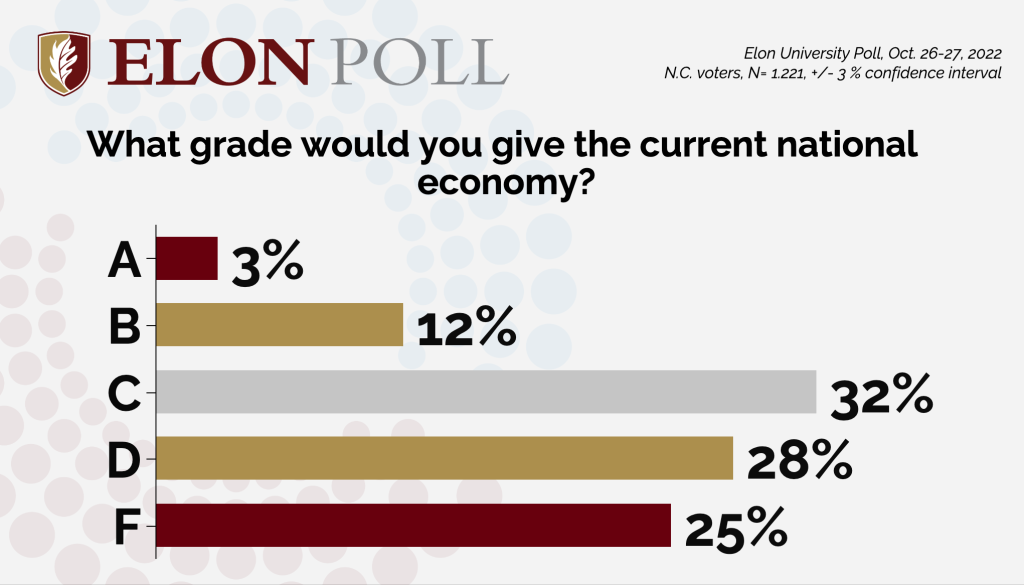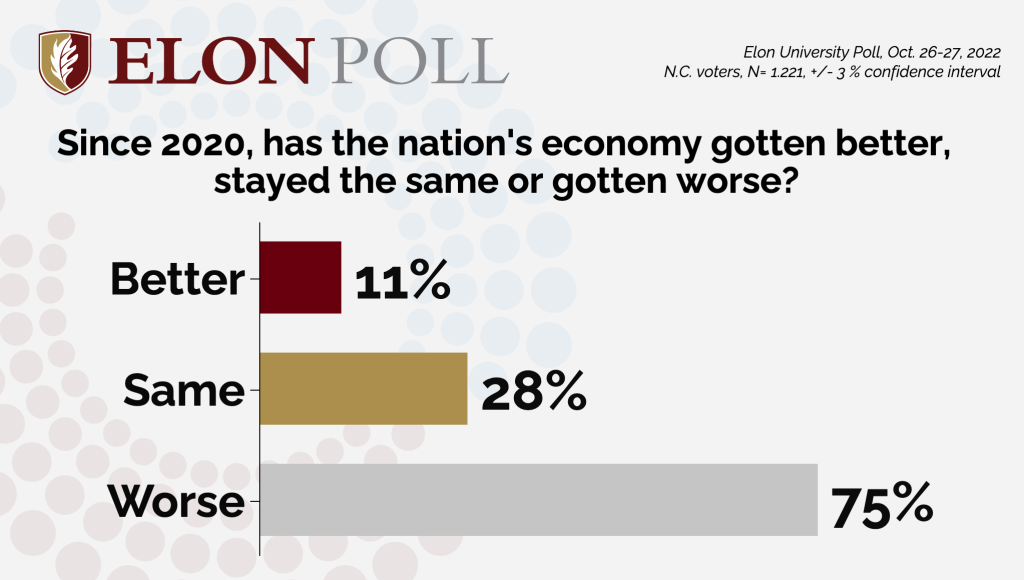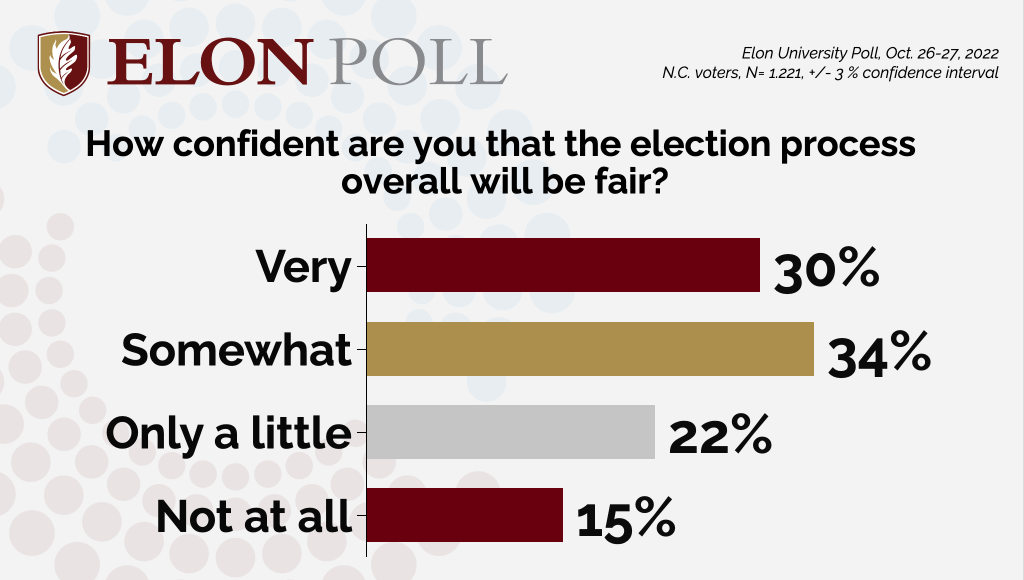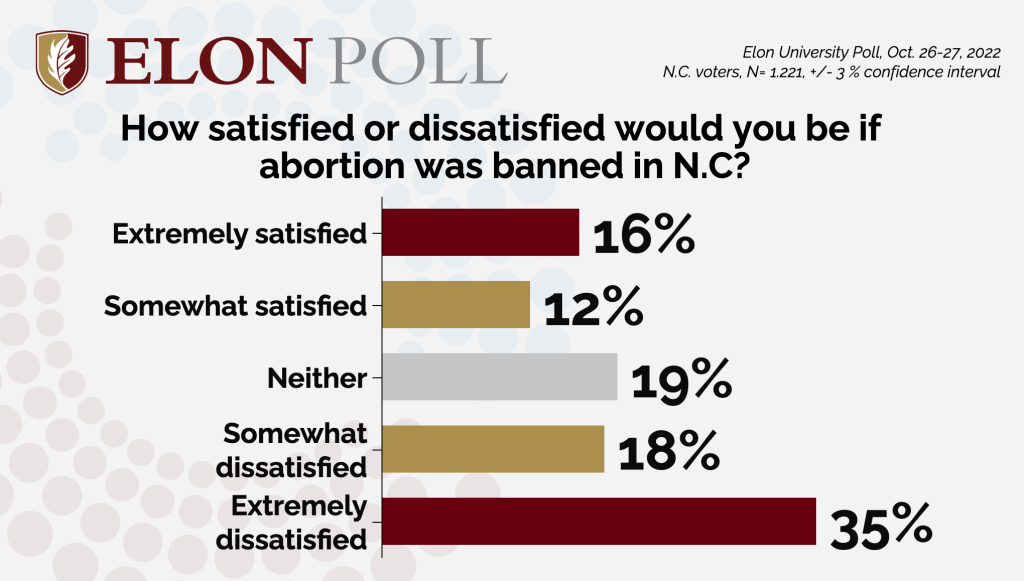The Elon University Poll conducted a survey of more than 1,200 N.C. voters asking for their thoughts on a range of topics that are factoring into this year’s general election.
Full Report with Methodology & Cross Tabs
Most North Carolina voters say they are more motivated to head to the polls during this year’s election, with many carrying with them a negative impression about the economy and how various economic factors have impacted their lives, the Elon University Poll has found.
More than half (53 percent) give the national economy a “D” or an “F,” with 75 percent saying the nation’s economy has gotten worse since 2020. Asked to look at their own financial situations, 55 percent of the state’s voters say it has gotten worse since 2020 while only 14 percent say it has gotten better.

In the wake of the U.S. Supreme Court decision overturning Roe v. Wade, abortion access is top of mind with many N.C. voters, with 44 percent saying they have been following news about new or changing abortion restrictions “fairly closely” and another 28 percent saying they have followed that news “very closely.” While two-thirds of N.C. voters say they expect the decision to leave abortion restrictions up to the states will have little impact on them or their families, 53 percent say that they would be “somewhat” or “extremely” dissatisfied if abortion were to be banned in North Carolina.
Turning to the integrity of the 2022 general election, the Elon Poll found that confidence in the process and the results has improved slightly since the 2020 election. Thirty percent of N.C. voters say that they are “very” confident that the election process overall will be fair, compared to 24 percent in 2020. The poll found that 34 percent say they are “very” confident that votes will be counted properly this November compared to 24 percent in 2020.
“As a closely divided state, North Carolina is reflective of a national pattern in which neither party dominates on all issues for persuadable voters,” said Jason Husser, director of the Elon Poll and associate professor of political science. “As a result, campaigns are attempting to rally their bases while elevating their side’s preferred considerations on the top of unaffiliated voters’ minds. Our data suggests Republican candidates will do well to emphasize the economy while Democratic candidates have advantages on abortion, climate change, and race relations.”
The Elon Poll also asked voters which political party they felt closer to on a list of prominent issues. The poll found that a plurality of voters felt closer to the Republican Party on issues including the economy, crime, immigration, foreign policy, the size of government, and oil, gas and energy issues. The results showed that a plurality of voters felt closer to the Democratic Party on issues including gun control, health care, voting policies, education, abortion, climate change and race relations. On every issue, at least 16 percent say they do not feel closer to either party on that issue.
The survey of 1,221 North Carolina voters was conducted Oct. 26-27, 2022, using an opt-in online sample provided by Lucid, LLC. More information about the Lucid marketplace and quality tests are available here. The survey has a credibility interval of +/- 3 percent. The credibility interval is an accuracy measure for opt-in online surveys. A fuller explanation of the credibility interval and the survey methodology are available in the full report.
The Economy
Economic concerns appear to be high on the list of issues for voters heading into the general election following a stretch of high inflation and ongoing speculation that a recession may be looming in the future. N.C. voters appear to have soured on the economy since the Elon Poll asked them to grade the national economy in February 2020. At that time, 19 percent of voters gave the economy an “A,” compared to 7 percent in October 2020 and just 3 percent now. Another 33 percent in February 2020 gave the economy a “B” compared to 19 percent in October 2020 and just 12 percent now. At the other end of the spectrum, 5 percent of voters in February 2020 gave the economy an “F” compared to 16 percent in October 2020 and to 25 percent — one in four — now.
The Elon Poll found a split along party lines, with Republicans taking a darker view of the economy today than Democrats. Seventy-three percent of Republicans gave the national economy a “D” or an “F” compared to 33 percent of Democrats. Additionally, 89 percent of Republicans say that the economy has gotten worse since 2020 compared to 62 percent of Democrats. Republicans were also more likely to say that inflation has had a very negative impact on them and their families.

“Few North Carolina voters rate the economy highly, and four out of five say inflation is negatively affecting them personally,” Husser said. “A majority of voters think President Biden is at least somewhat responsible for inflation, and more voters favor the Republican Party over the Democratic Party on the economy as an issue. These findings combined with the historical importance of the economy on midterm elections portend trouble for Democrats on the ballot in North Carolina.”
The same shift has occurred when people looked at how they are doing financially. Forty-two percent of N.C. voters in February 2020 say that their own financial situation has gotten better since 2017 while 20 percent say it has gotten worse and 37 percent said it had remained the same. The Elon Poll found that now 14 percent of N.C. voters say their financial situation has gotten better since 2020 while 55 percent say it has gotten worse and 31 percent say it has remained the same.
Turning to inflation, the Elon Poll found that 82 percent of N.C. voters have been negatively impacted by inflation during the past six months. That includes 28 percent of voters who say inflation has impacted them and their families “very negatively,” another 29 percent say it has impacted them “somewhat” negatively and an additional 25 percent who say it has impacted them “a little” negatively.
A majority of N.C. voters are pointing the finger at the administration of President Joe Biden, a Democrat, for their inflation woes. Forty-one percent say his administration is “very” responsible while another 28 percent say it is “somewhat” responsible. There is a clear split along party lines, with 70 percent of Republicans saying the Biden administration is “very” responsible for recent inflation increases compared to 20 percent of Democrats.
Election Integrity
The 2020 presidential election saw many discredited allegations of fraud, with many still contending that the election was not conducted fairly. While overall, confidence in the election process appears to have grown in North Carolina since that election two years ago, there is still a considerable split along party lines between those who think the November election will be conducted fairly and those who may question the results.
Among Democrats, 45 percent say they are “very” confident that the election process will be fair, compared to 14 percent of Republicans. Nearly one in four Republicans — 23 percent — say they are “not at all” confident that the election process will be fair, compared to 6 percent of Democrats. Half of Democrats say they are “very” confident that votes will be counted properly compared to 16 percent of Republicans. Unaffiliated voters are squarely in between those registered with either party.

Republicans are also more concerned about ballots being cast by those who are ineligible to vote. Twenty-seven percent say they are “not at all” confident that “only legally eligible voters will be able to vote” compared to 5 percent of Democrats.
“While many North Carolinians continue to have concerns about the electoral process, we’re seeing an increase in confidence,” Husser said. “In particular, only half as many voters are very concerned about violence after the 2022 election compared to the 2020 election.”
Where there is some consensus around the issue of accessing the ballot box. There’s little variation by party affiliation when voters were asked whether legally eligible voters will be able to vote without running into any problems. Overall, 32 percent of N.C. voters say they are “very” confident that will be the case and another 43 percent say they are “somewhat” confident.
While fewer N.C. voters now expect that violence may follow the election than did during the presidential election in 2020, which was followed by the Jan. 6 attacks on the U.S. Capitol, more than half are still on edge that the results could spur violent behavior. Two years ago, 74 percent of voters said they were “very” or “somewhat” concerned about violence breaking out after the election compared to 56 percent now.
The Elon Poll also asked for the opinions of voters on whether media will be fair to candidates of either party. Democrats were similar in their views regardless of which party the candidate belongs to, with 33 percent saying they are “very” confident that the media will be fair to Democratic candidates and 29 percent saying they are “very” confident the media will be fair to Republican candidates.
Results differed for Republican voters. While 40 percent say they are “very” confident that the media will be fair to Democratic candidates, 8 percent are “very” confident Republican candidates will be treated fairly by the media.
Abortion
While many states moved forward with legislative efforts to restrict access to abortion following the U.S. Supreme Court’s decision to overturn Roe v. Wade, North Carolina has not yet moved in that direction. The Elon Poll has found that Republican voters in the state are more likely to say that any action by North Carolina on abortion restrictions would have no impact on them or their families. Seventy percent of Republican voters say leaving abortion restrictions up to the states to decide would “neither positively or negatively” them or their families compared to 56 percent of Democrats.

The differences between members of the two parties are greater when voters were asked for their thoughts on abortion being banned in North Carolina, though. Thirty-one percent of Republican voters said they would be “extremely” satisfied with such a ban compared to 10 percent of Democratic voters and 11 percent of unaffiliated voters. Forty-eight percent of Democratic voters and 41 percent of unaffiliated say they would be “extremely” dissatisfied if abortion was banned in North Carolina while 13 percent of Republican voters hold that view.


